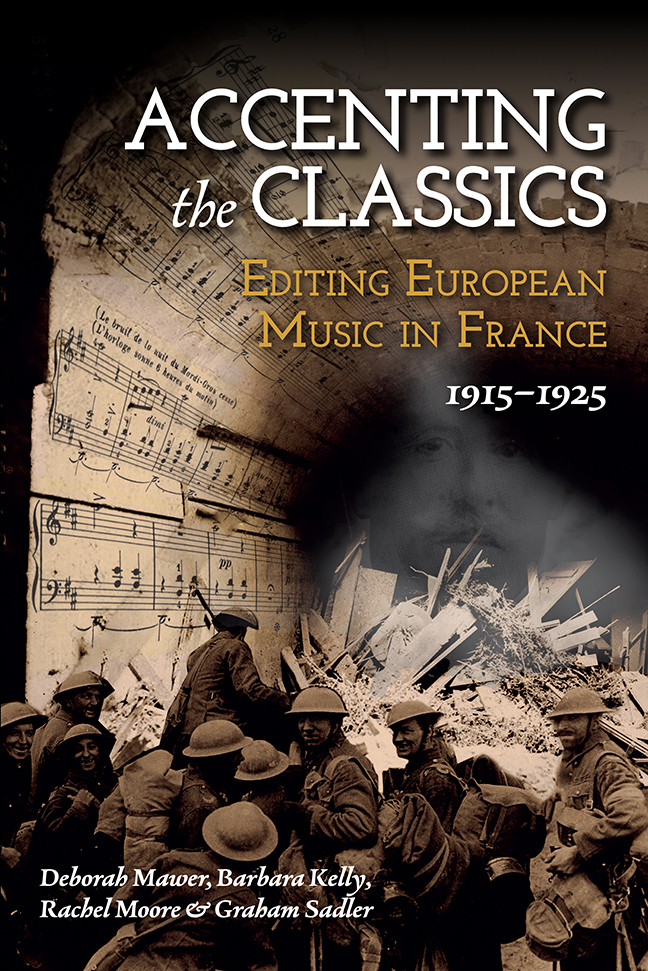Book contents
- Frontmatter
- Contents
- List of Figures
- List of Tables
- Notes on Co-authors
- Acknowledgements
- List of Abbreviations
- Note on the Text
- Introduction
- Part I Durand and His Édition Classique
- Part II Composer–Editor Case Studies
- Part III Beyond Editing: Pedagogy, Performance, Composition
- Afterword
- Select Bibliography
- Index
4 - Mozart as ‘Classic’ in Early Twentieth-Century France: The Case of Saint-Saëns's Mozart Editions
Published online by Cambridge University Press: 10 January 2024
- Frontmatter
- Contents
- List of Figures
- List of Tables
- Notes on Co-authors
- Acknowledgements
- List of Abbreviations
- Note on the Text
- Introduction
- Part I Durand and His Édition Classique
- Part II Composer–Editor Case Studies
- Part III Beyond Editing: Pedagogy, Performance, Composition
- Afterword
- Select Bibliography
- Index
Summary
This chapter examines the significance of Mozart as a symbol of the ‘classic’ in early twentieth-century France. It considers the symbolic value of Mozart as an Austro-Germanic composer who appeared to be above the battlefield and part of a wider European tradition, whilst also being deeply implicated in French musical and scholarly patriotism. I focus on the Mozart volumes in the Édition Classique, which were edited by the composer-performer Camille Saint-Saëns (1835–1921); the composer-conductor Joseph Guy Ropartz (1864–1955); the musicologist Adolphe Boschot (1871–1955); and composer-performer Louis Fournier (1877–1963). This determination to preserve Mozart for French performers is in sharp contrast to Saint-Saëns's high-profile campaign to ban Wagner and exclude contemporary Austro-Germanic music during the so-called Great War.
I concentrate on Saint-Saëns's editions and the controversy they caused because of the ageing composer's failure to take into account contemporary (French) scholarship on Mozart, notably by the arch-Wagnerian Teodor de Wyzewa and musicologist Georges de Saint Foix. For Jean Marnold, Saint-Saëns's editions represented a humiliation for the French in the cultural battle to claim Mozart as theirs. The chapter follows the critical reaction to these editions in the press: in particular, the controversy over the editor's lack of engagement with contemporaneous scholarship on Mozart in France and the rival Mozart Sonatas edited by Édouard Risler (1873–1929) for the Collection Orphée. The controversy reflects the status of Saint-Saëns, who was already considered to be out of step with his time and a ‘classic’ in his own right, at the end of his exceptionally long musical career.
Chapter 4 also examines the Mozart editions prepared by Ropartz, Boschot and Fournier and their very different approaches to editing Mozart and engaging with scholarship; there was clearly not a unified editorial approach to representing this musical giant. It also looks at subsequent attempts to formalise French interest in Mozart in the establishment of the Société d’études mozartiennes, which was part of a pan-European arm of the Association internationale Mozartienne de Salzbourg. This research provides new insights into the status of Mozart in France during and after the First World War, complementing recent research on the appropriation of Mozart during the Second World War, showing Mozart's significance and value in France and Europe during the First World War and the interwar period.
Saint-Saëns as editor
Saint-Saëns had an important role in Durand's Édition Classique, as Chapter 1 has indicated.
- Type
- Chapter
- Information
- Accenting the ClassicsEditing European Music in France, 1915-1925, pp. 97 - 122Publisher: Boydell & BrewerPrint publication year: 2023



